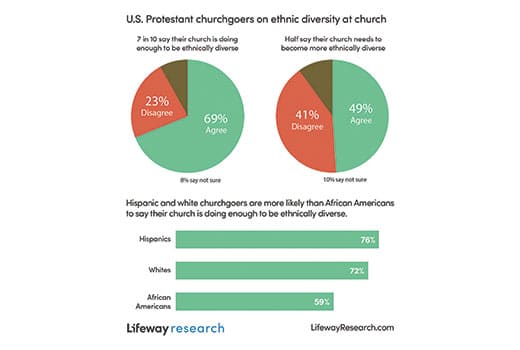Although pastors are doing more to encourage racial reconciliation and churchgoers say their church is doing enough to be ethnically diverse, nearly half of churchgoers say their church needs to become more ethnically diverse.
In a survey of American churchgoers, 49 percent say their church needs to become more ethnically diverse, including 18 percent who strongly agree. At the same time, nearly 7 in 10 say their church is doing enough to be ethnically diverse (69 percent).
“When a church is largely one ethnicity, making progress toward ethnic diversity is not easy. Yet that doesn’t mean many of these churches are not trying,” said Scott McConnell, executive director of Lifeway Research.
For some, these two things are connected. African-American churchgoers (60 percent), churchgoers who attend a worship service one to three times a month (56 percent), and those without evangelical beliefs (57 percent) are the most likely to say their church needs to become more ethnically diverse. And these groups are among the least likely to say their church is doing enough to be ethnically diverse. Nearly 3 in 5 African-American churchgoers (59 percent) say their church is doing enough to be ethnically diverse. Nearly 2 in 3 churchgoers who attend one to three times a month (64 percent) and those without evangelical beliefs (66 percent) say the same.
Denominationally, Methodist (90 percent) and Restorationist movement (71 percent) churchgoers are most likely to agree their church needs to become more ethnically diverse. Baptists (62 percent) and Lutherans (58 percent) are among the least likely to agree their church is doing enough to be ethnically diverse.
Age and gender are also factors in a person’s perception of ethnic diversity in the church. The youngest adult churchgoers — those ages 18-34 (63 percent) and 35-49 (63 percent) — are more likely than those 50-64 (46 percent) and over 65 (33 percent) to agree their church needs to become more ethnically diverse. And females (65 percent) are less likely than males (73 percent) to say their church is doing enough to be ethnically diverse.
Pastoral Leadership in Racial Reconciliation
Lifeway Research asked U.S. Protestant pastors about their engagement in a variety of practices to encourage racial reconciliation. In the past three months, most pastors have discussed racial reconciliation with leaders in their church (63 percent) and spent time socializing with neighbors of other ethnicities (70 percent). More than 2 in 5 have led times of corporate prayer for racial reconciliation (44 percent), preached on racial reconciliation (44 percent), invested church funds in changing local economic inequalities (44 percent), and met regularly with pastors of other ethnicities (46 percent). Fewer have led a public lament over racial unrest or injustice in the past three months (16 percent), and 8 percent of pastors said they had not engaged in any of these activities to encourage racial reconciliation.
Compared to a 2016 Lifeway Research study, more pastors are socializing with neighbors of other ethnicities (70 v. 57 percent), discussing the issue with church leaders (63 v. 51 percent), meeting regularly with pastors of other ethnicities (46 v. 40 percent), and investing church funds in changing local economic inequalities (44 v. 31 percent). However, fewer pastors today are leading times of corporate prayer for racial reconciliation (44 v. 53 percent) or leading public laments over racial unrest or injustice (16 v. 20 percent).
“It’s encouraging to see pastors increasingly engaged in many activities that foster racial reconciliation,” McConnell said. “Perhaps the most surprising is the growth in the number of churches engaged financially in righting economic inequalities.”
Factors in Racial Reconciliation Engagement
Demographics such as age and ethnicity are factors in a pastor’s likelihood of engaging in some of these activities. Pastors over 65 (60 percent) are the least likely to socialize with neighbors of other ethnicities, while Hispanic pastors are among the most likely (82 percent). Pastors over 65 are also the least likely to meet regularly with pastors of other ethnicities (35 percent). African-American pastors are the most likely to invest church funds in changing local economic inequalities (65 percent) and among the most likely to lead a public lament over racial unrest or injustice (34 percent).
Mainline pastors are more likely than evangelicals to engage in many of these practices. Mainline pastors are more likely than evangelical pastors to invest church funds in changing local economic inequalities (55 v. 41 percent), discuss the issue with leaders in the church (72 v. 59 percent), preach on racial reconciliation (55 v. 40 percent), lead a public lament over racial unrest or injustice (20 v. 12 percent), or lead corporate prayer for racial reconciliation (55 v. 41 percent).
When it comes to preaching on racial reconciliation, pastors in the Midwest are least likely to have preached on the topic in the last three months (36 percent). Pastors with doctoral degrees are among the most likely to have preached on racial reconciliation (51 percent).
Denominationally, Methodist (65 percent) and Presbyterian/Reformed (64 percent) pastors are more likely than Baptist (34 percent), Lutheran (36 percent), Pentecostal (44 percent), Restorationist movement (38 percent) or non-denominational (38 percent) pastors to invest church funds in changing local economic inequalities.
For more information, view the complete churchgoer and pastor reports at LifewayResearch.com.
— Marissa Postell Sullivan is managing editor for LifewayResearchcom.
